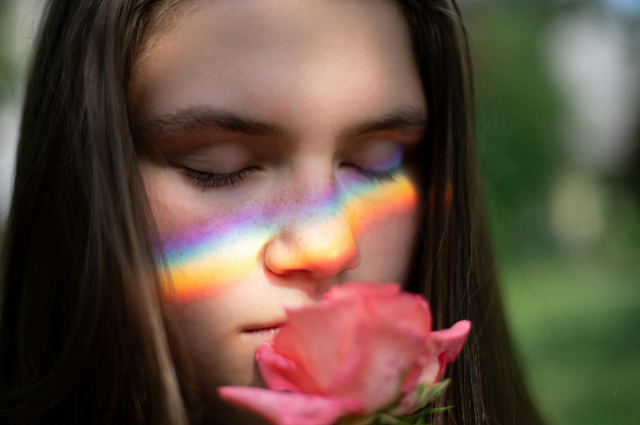
If we close our eyes for a second and think about the smell of rain on dry ground, or the smell of our mother’s kitchen when she makes our favorite dish, we notice something — those smells don’t just remind us of a scent. They pull us into a memory. We can see the day, hear the sounds, and feel the moment again. That’s because smell isn’t just one of the five senses — it’s like a time machine.
The Forgotten Sense
We talk a lot about sight and sound. We design beautiful things to look at, and melodies to please the ear. But smell, the quiet sense, stays ignored. Yet it’s the most powerful one when it comes to emotions and memory. Why? Because smell takes a shortcut in our brain.
When we see or hear something, our brain processes it logically before deciding how we feel about it. But smell doesn’t wait. It goes directly to the part of the brain that handles memory and emotion — the limbic system. That’s why one small whiff can hit you like lightning: no warning, no logic, just feeling.
When Air Becomes a Memory
There’s a scientific name for the smell of rain — petrichor. When the first drops fall, they release a chemical from the soil called geosmin, and our brains immediately connect it with relief, freshness, and calm. We don’t just smell the rain; we remember every rainy day we ever lived.
The same happens with perfumes. A person’s perfume can haunt you long after they’re gone. You might smell it on someone else years later, and your heart stops for a second — not because of the perfume, but because it carries a piece of someone you once knew.
Smells are like invisible fingerprints — no two people experience them the same. Your “smell map” is built from your own life. The smell of a hospital might comfort a doctor but scare a patient. The smell of smoke might mean campfires to one person, and fear to another.
Why You Can’t Describe a Smell
Try explaining the smell of coffee without using the word coffee. You can’t. You’ll say “strong,” “warm,” or “bitter” — but those are feelings, not smells. Language fails here because smell has no dictionary.
We have thousands of words for colors and hundreds for sounds, but only a few for smells. That’s because smell and language sit in different parts of the brain — they don’t connect easily. This is why smell feels so personal. It’s not something we describe. It’s something we remember.
The Emotional Side of Smell
Smells can comfort, heal, or even warn us. A newborn baby recognizes their mother by smell before sight. A soldier can smell gunpowder and feel fear before seeing the battlefield.
Smell is our oldest sense — it evolved before vision and hearing. It helped our ancestors survive, sense food, danger, or shelter. But in modern life, we forget this power. We spray perfumes, use air fresheners, and cover natural scents, losing part of our emotional language.
Our rooms smell nice, but our memories become empty. Artificial smells don’t carry emotions — they’re too clean, too edited.
The Business of Smell
There’s a whole field called scent marketing. Companies use smell to make you feel a certain way: warm bread near bakeries, lemon in cleaning products, and coffee aroma in clothing stores. They know smell builds trust faster than sight or sound.
Hotels use signature scents to make you remember your stay. Airlines use calming smells to reduce flight anxiety. Even new cars have a special scent added — “the new car smell” — to make you feel like you own something powerful.
You think you’re making choices, but your nose is quietly leading you.
The Smells We Never Forget
Everyone has one — a core smell memory. It’s rarely something big. It might be the smell of an old book, your grandmother’s shawl, wet mud, or chalk dust in your childhood classroom.
These smells are like emotional passwords. They unlock old versions of you — the ones you forgot existed. Sometimes a smell can make you cry without reason because it’s tied to something your mind forgot, but your nose didn’t. That’s how smell keeps the past alive — hidden in plain air.
The Vanishing Sense
Here’s the tragedy: smell is the first sense to fade as we grow old. Diseases like Alzheimer’s often start with the loss of smell. It’s like the brain slowly losing its emotional memory.
People forget faces and names — but before that, they forget smells. And when you lose smell, food becomes tasteless, days feel dull, emotions feel distant. You don’t just lose scent; you lose connection.
The Art of Smelling
We don’t need fancy perfumes to experience smell deeply — we just need to slow down. Next time you eat, actually smell your food before tasting it. When it rains, breathe in and notice how the air changes.
Smell your clothes after they dry in the sun — that’s sunlight trapped in fabric. Smell an old letter or a notebook — that’s time, preserved in paper.
The more you notice smells, the more you train your memory to live richly. Smell is mindfulness in its rawest form. It forces you to exist now.
We think memories live in our brains, but maybe they also live in the air around us, waiting to be unlocked. Smells don’t fade easily — they travel through time, clinging to fabric, walls, and emotions. They whisper, “Remember?”
So the next time you catch a faint scent that makes your heart pause, don’t brush it off. That smell is not random. It’s a message from your past self — proof that the world you lived in still exists, floating somewhere in the air.
